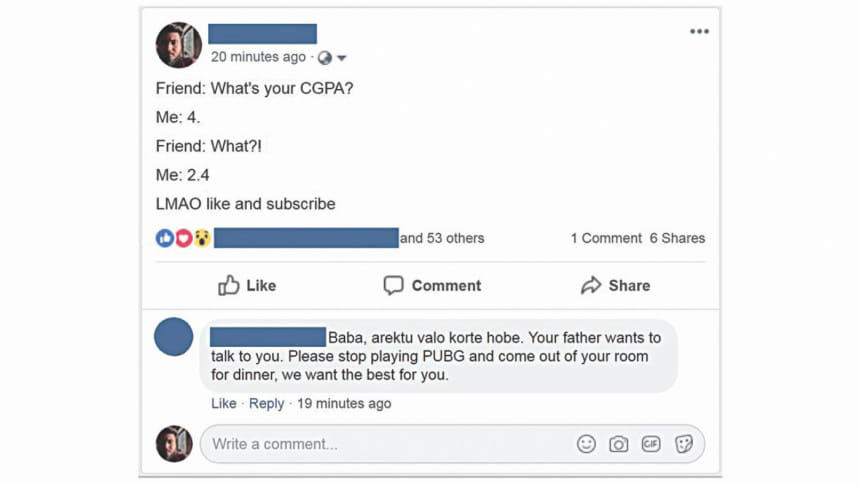Teaching your parents the dos and don'ts of social media

We all remember a simpler time when social media was a "young people only" zone. But then the age of smartphones came about and soon after, you began receiving friend requests from your one moderately tech savvy uncle. That friend request seemed to be some kind of cue for the floodgates to open, because all of a sudden, everyone from your relatives to your teachers was on social media, and specifically on Facebook. And then came that one dreaded day. Your friends had warned you about this; they had shared their traumatic experience. You didn't want to believe them. One fine day, you woke up, and hiding innocently in that friend request list were two names you were intimately familiar with. Your parents had arrived.
After having tried to ignore their presence on your profile for as long as you could, and smiling in the face of personal messages in public comments sections, you decided you just couldn't go on any longer. You must teach your parents how this works. Thus, you embark upon a long and gruelling journey.
LESSON 1: CONTEXTUAL COMMENTS
Parents are prone to trying to "reconnect" with people they can't often get their hands on in public. Usually those people are your cousins who also actively avoid awkward social gatherings. When you notice your Mum's comment on your cousin's swanky profile picture saying, "You are looking very pretty, ma. May you be blessed with all the happiness in the world. How is university life? Say hello to your parents from me," you know you've got to intervene. You can't have your mum be that aunty. After painstaking effort, you manage to explain that comments are not letters, and should only pertain to the specific context of a post. Even so, your cousins are only being blessed with all the happiness in the world, but at least there are no longer any irrelevant questions being asked. You win some, you lose some.
LESSON 2: BANGLA IN ENGLISH
The art of writing Bangla with English letters has been perfected over the years. We've all spelt things wrong and corrected them over time, but now that we've gotten the hang of things, we can't stand people who haven't figured it out yet. Parents come strolling into this arena with no prior knowledge, and 2004 nostalgia hits you with "valo" and "lagce". You've got to take up the mantel of explaining that "bh" cannot be substituted with a "v" to your parents, because otherwise, people will judge you for not having raised them properly.
LESSON 3: IF IT'S ON THE INTERNET IT MUST BE TRUE
We have all seen the quotes by "Einstein" and "Lincoln" online, and we've learnt to systematically ignore them. Our parents, however, have not. So now you're faced with the magical banana that cures cancer, two easy steps to get "free" internet, and endless lists of famous people who apparently made statements that support your father's rigid stances on societal issues. Although sharing a couple of misquoted posts might seem harmless, there are a lot of not-so-harmless posts online specifically meant to trick or trigger naive users. The abundance of fake news online in current times is alarming, and spotting what's fake is becoming increasingly challenging. As algorithms figure out our preferences, fake news catered to exactly what our parents want to hear appears on their newsfeed. This one usually takes the longest, but you have to teach your parents how to cross check news on multiple platforms to verify it, for their own safety.
LESSON 4: NO THEY DIDN'T "SEND" THAT TO YOU, THEY "POSTED" IT.
Commonly referred to as the "Eta ke pathaise?", this lesson focuses on explaining the difference between someone sending you a message vs. making a post. Parents are often known to think that everything on their homepage has been specifically sent to them by their friends. Anytime you show them a funny post shared by a random meme page they'll laugh and then ask who sent it to you. You think of explaining how there are friends-only posts made by your friends, public posts made by your friends, and then public posts made by public groups; but then there's also the whole friends-of-friends situation. That's when you realise you've got to pick your battles. "Eta keu pathay nai, ammu".
LESSON 5: FOLLOW-UP LESSONS
Last week you explained to your parents that if they share something then everyone on their friend list can see it. Horrified, your Dad wanted to swear off Facebook for good. You should have just let him do that. Instead, being the model child that you are, you decided to explain to them that if they wanted only specific people to see something they could just send it as a message. Of course custom privacy was way too advanced, but this was a good temporary work around. This week however, you've woken up with more herbal cures to cancer in your inbox, and realised that at least when they were sharing it on their own walls you weren't being notified of it. Upon confrontation you realise they've sent this to at least fifty people, and so you've got a follow up lesson on your hands. This consists of sensitively telling your parents that most of the things they find online are either very old (since they've joined so late) or aren't quite as interesting as they think. Think before you share, and think hard about whether it needs to be shared, are lessons that you must teach with extreme caution, lest they get offended.
Lastly, this journey is particularly gruelling because no lesson is learned upon a single iteration. Everything must be explained multiple times over the course of months to make any lasting impact. Moreover, upon the slightest show of irritation your parents will confront you with the "They patiently taught you how to walk, talk, and wipe your butt, but now you don't even have a few minutes to help them out" post, because, thanks to some geniuses online, they now have access to such material.
However, it's not all bad. Two months ago I showed my father a post about something, and he asked me if I had cross-checked that because he thought it wasn't real. Turns out, it was indeed false. If there was ever a moment I had been proud of myself upon being blatantly wrong, that would be it.
Rabita Saleh is a perfectionist/workaholic. Email feedback to this generally boring person at [email protected]

 For all latest news, follow The Daily Star's Google News channel.
For all latest news, follow The Daily Star's Google News channel. 



Comments